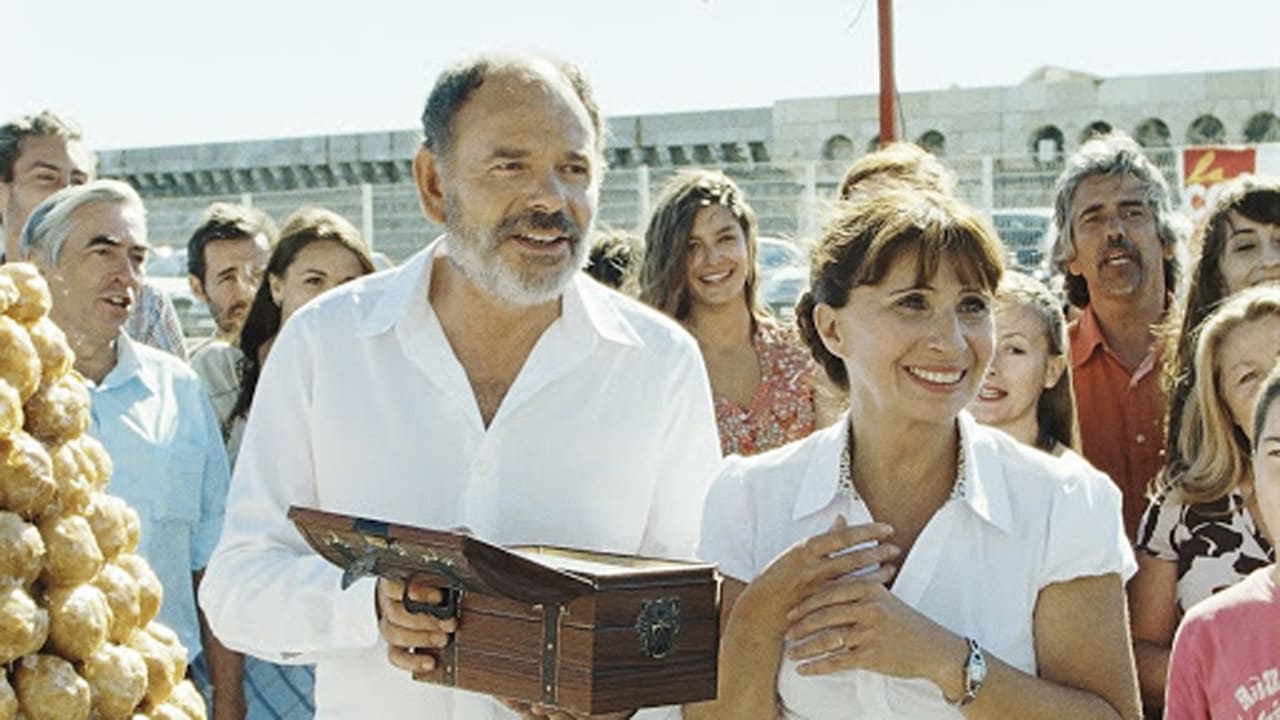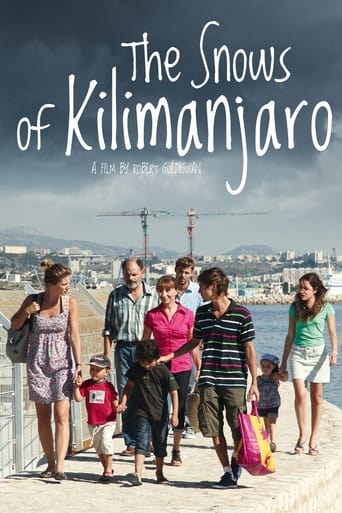

A bit overrated, but still an amazing film
... View MoreIt isn't all that great, actually. Really cheesy and very predicable of how certain scenes are gonna turn play out. However, I guess that's the charm of it all, because I would consider this one of my guilty pleasures.
... View MoreExcellent and certainly provocative... If nothing else, the film is a real conversation starter.
... View MoreIt's a movie as timely as it is provocative and amazingly, for much of its running time, it is weirdly funny.
... View Morelook she said while opening the curtains,here they are ......"inspired by the poem by Victor Hugo "Les Pauvres Gens" " appears after the last picture ;This is one of my favorite poems ,an epic one which depicts the struggle of humble fishermen and their wives :Jeanie and her husband are poor and they live in a hut by the sea ;their neighbor ,a widow ,dies .Unbeknownst to their spouse,they both decide to take in the two orphans ."Nous Avions Cinq Enfants ,Cela Va En Faire Sept" (we had five children ,now it will make seven).Humble heroes in the shadow ,like Marie-Claire and her husband.And there was this old song ,one of the big hits of French Winter 1966-67, a wintry song by Pascal Danel ,who said he was inspired by Hemingway .This is really a memorable wonderful song which thoroughly deserved its success.And there was Darroussin and Ascaride ,both in a Cesar caliber performance ;the actress is absolutely sublime when they sing the song to celebrate their wedding anniversary ,a scene to rival the best of the classic cinema of Pagnol, Carné ,Duvivier or Grémillon ;I cannot think of another living actress whose face expresses compassion or true happiness as Miss Ascaride does .All her life ,she had to sacrifice her dearest dreams (becoming a nurse ,and now spending the Holiday of her lifetime ) and yet she says ,"I've always been happy" :so strong is her conviction that we do believe her .There's a stunning chemistry between her and Darroussin whose playing is miraculous too :an unionist whose illusions have gone,slowly by inexorably ,down the drain:but he remained true to himself ,true to Jean Jaurès,the great pacifist who was the first French victim of WW1;his "return good for evil" philosophy shows that sincere socialism (not the champagne socialists) and Jesus Christ's words (not the political Church)-without a single hint at religion in the film- come to the same conclusion ,Victor Hugo Guédiguian mentions at the end of his work was a Christian and a socialist .And there is Mr Guédiguian :we already knew ("La Ville est Tranquille " and other magnificent generous works) he was one of the greatest living directors in France ,along with Philippe Lioret ,with whom he shares the same sympathy for the human kind ;they show ,like Frank Capra and Frank Borzage in America before them ,that finer feelings may mean,when a clever director is in control, deeply moving efforts .No sex ,no violence (except for two short sequences )) ,no commercial dishonest compromise;as high as Kilimandjaro!
... View MoreThe question is simple but is far from being rhetorical: Should Art be an imitation of life, or should it be the other way around? The advocates of realism will surely make the first choice. In their view, life is full of ugliness that Art must faithfully portray, with absolutely no recourse to artificial embellishments. Often, the artist cannot even see the difference between realism and pessimism. In the case of cinema, in particular, the audience must leave the theater filled with dark thoughts and feelings of vanity. Happy ending is a taboo, and the positive message is hard to find (since life itself doesn't support it). On the opposite side of realism, idealism reserves a more noble and ambitious role for Art; namely, to create high standards of thinking and behavior, thus offering psychological, ideological and aesthetic motivation for man to overcome the inherent weaknesses of his/her nature and reach these standards. Robert Guédiguian's wonderful movie "The Snows of Kilimanjaro" (France, 2011) masterfully balances between these two opposite philosophical trends. On the one hand, there are the hard realities of our time: the economic recession and consequent unemployment, the growing youth resorting to crime, the refutation of the visions of the Left, and the (non-glorious) compromise of the latter with modern neoliberalism where there is no social care for the weak. On the other hand –and these are the elements progressively dominating the film up to the final catharsis- scenes of incredible beauty parade through the eyes of the viewer, exhibiting a triumph of friendship, humanity, forgiveness, solidarity (a worthy substitute for absent state care)... And, above all, love and togetherness that keep a marriage alive over time and against the difficult challenges of life! We left the theater full of positive thoughts and feelings. Finally leaving behind the painful memories of sickening movies by Michael Haneke or the Coen brothers...
... View MoreIn the sense that both have a penchant for introducing politics into films it could be argued that Robert Guidiguian is a Gallic Ken Loach but the link is tenuous at best for whilst Loach is only happy when clubbing the audience over the head with his tainted vision - Look, see what the bastard English are doing to the Saintly too-good-to-live IRA - Guidiguian is more subtle so that his viewpoint manifests itself wafting gently as a hint of Arpege through a boudoir keyhole. And Loach, of course, does not have access to and probably would sneer at talents like Gerard Meylan, Jean-Pierre Darroussin and the outstanding Ariane Ascaride - indeed it's fair to say that no English actress of her generation can illuminate a scene or a room like Ascarides and we have to turn to the next generation and Vanessa Redgrave to come close. This is yet another Marseille-based fable and this time around Larroussin is the Union official who, in the interests of fairness and solidarity, enters his own name in a draw to nominate 20 workers who will be dismissed to cut labor costs. Alas, one of the twenty sees fit to rob Larroussin along with his wife and sister and brother-in-law. The robbers are masked and quite by chance Larroussin discovers the identity of his ex-colleague. At this stage Guidiguian introduces his main themes; the young worker sees only that Laroussin is 'middle-class', drives a car, dines in restaurants, watches television and assumes that it has always been this way. He has no concept that Larroussin was once working-class and fought to enjoy a better life not just for himself and his family but for all the workers in the shipyard who he represented. The young colleague does not know his father, his mother has no interest in either him or his two much younger brothers and in fact he spends his share of the proceeds of the robbery to pay household bills and treats for his siblings. Larroussin withdraws the charges but it is too late to stop the wheels of justice; independently at first and then in concert, Larroussin and wife Ascaride extend practical help to the young siblings of the man who robbed them. With any other cast and any other director (Loach, for instance) this would be unpalatable propaganda but with this cast and this director it emerges as a wonderful Capra-esque feel good movie. Highly recommended.
... View MoreA few years ago, I read the novel 'How to be good' by Nick Hornby. As the title suggests, this wonderful book is about being good, and about the problems connected with being good. Les Neiges du Kilimandjaro reminded me of this book, because the film is also about being good. Michel is a blue collar worker at a company in the port of Marseille, and takes pride in his 'being good'. He has always tried to be a responsible citizen, and is one of the union representatives in his company. When the company has to lay off twenty workers, Michel proposes to organize a lottery and puts his own name on the list, although as a union man he is not obliged to. Michel loses his job, and soon afterward gets robbed in his own house. By coincidence, he learns the identity of the criminals, and they are arrested. The events connected with the robbery make him doubt his own 'goodness'. A confrontation with one of the robbers puts everything he thought to know in a different perspective: Michel recognizes that he has become 'bourgeois'. His supposed 'goodness' turns out quite differently than he thought. This charming movie turns things upside down and asks interesting questions, but doesn't give clear cut answers. Michel is 'good', but not as good as he thought. And the thief is 'bad', but not as bas as it seems. The story zigzags nicely between the moral dilemmas, and never becomes heavy-handed. The overall tone is upbeat, and especially the end scenes are almost heartbreakingly optimistic. Director Guédiguian has made a film about ordinary people in their daily lives, and shows us that those lives can be very interesting. Would it be exaggerated to call him the French Mike Leigh?PS Don't let yourself be put off by the title. The movie never leaves sunny Marseille. The title is merely a reference to a very well-known French song.
... View More